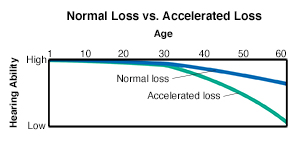As you age, some hearing loss is normal. Long-term exposure to loud noises may speed up hearing loss. You may lose not only the ability to hear how loud a sound is, but also the ability to hear certain types of sounds. For example, you might not be able to hear some of the high-pitched sounds of a child's voice or a fire alarm.
Normal loss
With aging, tiny hair cells in the inner ear undergo changes. Nerve cells, also part of the inner ear, can also be affected. This is age-related hearing loss called presbycusis. Most people don't notice normal hearing loss until their middle years. Others might not notice it until late in their lives. It's most often a slow and painless process.
Accelerated loss
Exposure to loud noise may cause brief hearing loss and ringing in your ears called tinnitus. If your exposure was short, you may recover. But long-term exposure day after day can affect your hearing for life.
Noise hurts more than your hearing
Did you know that loud noises can affect your whole body? Loud noises can:
-
Raise blood pressure
-
Disrupt sleep patterns
-
Cause muscle strain
-
Cause emotional stress
-
Harm digestion


